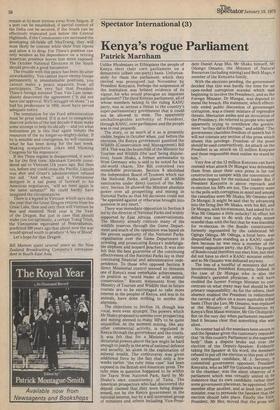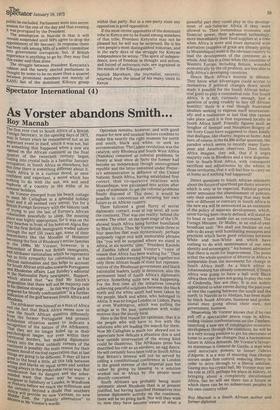Spectator International (3)
Kenya's rogue Parliament
Patrick Marnham
Unlike Rhodesians or Ethiopians the people of Kenya elect their own parliament on a democratic (albeit one-party) basis. Unfortunately for them the parliament which they elected was prorogued last November by President Kenyatta. Perhaps the suspension of the institution was belated evidence of its vigour, for who would prorogue an impotent parliament? The third Kenyan parliament, all of whose members belong to the ruling KANU party, was so serious a threat to the country's super-parliamentary government that it could not be allowed to meet. The apparently unchallengeable authority of President, through KANU, over parliament and the people was in real jeopardy.
The story, or as much of it as is presently visible, begins in October when, just before the elections, the Kenya government gazetted the Wildlife (Conservation and Management) Bill 1974. This was the brainchild of the Minister for Tourism and Wildlife (the 'and' being disjunctive), Juxon Shako, a former ambassador to West Germany who is said to be noted for his old-world charm. The Bill contained two remarkable provisions. Section 9 abolished the independent Board of Trustees which ran the National Parks, and placed all wildlife sanctuaries under direct control of the Ministry. Section 10 allowed the Minister absolute power over all prospecting and mining in National Parks so that his decisions could not "be appealed against or otherwise brought into question in any court."
There was immediate opposition to Section 9 led by the director of National Parks and widely supported by East African conservationists. The Ministry already controls many of the wildlife reserves through the Game Department and much of the opposition was based on the proven superiority of the National Parks organisation over the Game Department in arresting and prosecuting Kenya's indefatigable elephant and leopard poachers. It was also felt that the best guarantee of the continuing effectiveness of the National Parks lay in their continuing financial and administrative independence. To those who opposed Section 9 direct Ministerial control seemed to threaten one of Kenya's most remarkable achievements,. its position as "world leader of wild animal conservation." Recent statements from the Ministry of Tourism and Wildlife that in future tourists are to be encouraged to take more interest in the peoples of Kenya, and less in its animals, have done nothing to soothe the alarmists.
The objections to Section 10, though less vocal, were even stronger. The powers which Mr Shako proposed to assume over prospecting and mining seemed to many MPs to be quite unjustified. At the moment mining, like any other commercial activity, is regulated in Kenya through the government and the courts. It was felt that for a Minister to enjoy dictatorial powers above the law might be hard enough to justify in the area of national defence and security, let alone in the exploitation of mineral wealth. The controversy was given additional force by the fact that only a few weeks earlier "the ruby mine case" had been exposed in the British and American press. The ruby mine in question happened to lie within the Tsavo West National Park, hard by Mr Shako's own constituency of Taita. The American prospectors who had discovered the deposit claimed that they were being dispossessed, not by the Kenya government in the national interest, but by a self-interested group of ministers and others including Vice-Presi
dent Daniel Arap Moi, Mr Shako himself, Mr Odongo Omamo, the Minister of Natural Resources (including mining) and Beth Mugo, a member of the Kenyatta family.
With the elections pending, the government decided that this was hardly the time for an open-ended corruption scandal which was beginning to involve the Presidency, and so the Foreign Minister, Dr Mungai, was deputed to mend the breach. His statement, which effectively ended public .discussion of government corruption, was a classic mixture of repressive threats, libertarian asides and an invocation of the Presidency. He referred to people who were apparently trying to overthrow the government "as they did in Ethiopia," and added; "The government cherishes freedom of speech but it will not tolerate any section of the press which abuses this privilege. Freedom of the press should be used constructively. An attack on the President is an attack on 12 million Kenyans and those responsible must realise we stand by him."
Very few of the 12 million Kenyans can have realised what attack Dr Mungai was defending them from since their own press is far too constructive to tamper with the convention of absolute respect for the national leader. But if President Kenyatta is above reproach and re-election his MPs are not. The country went to the polls with corruption in mind and among the casualties were Mr Shako, Mr Omamo and Dr Mungai. It might be said that by advancing into the firing line Mr Shako, with his Bill, and Dr Mungai, with his statement, had asked for it. Was Mr Omamo a little unlucky? In effect his defeat was less to do with the ruby mines scandal than with the fact that he was standing for re-election in the Bondo constituency formerly represented by the celebrated Mr Oginga Odinga. Mr Odinga, a local hero, was disqualified from standing as a KANU candidate because he was once a member of the banned opposition party, the KPU. The people of Bondo could therefore not elect him, but they did not have to elect a KANU minister either, and so Mr Omamo was defeated anyway.
The loss of a handful of ministers did not inconvenience President Kenyatta. Indeed, in the case of Dr Mungai who is also the President's personal physician, it will have enabled the former Foreign Minister to concentrate on what many may feel should be his primary responsibility. As for the others, their absence enabled the President to redistribute the carrots of office on a more equitable tribal basis. (Thus the Luo, Mr Omamo, was replaced at the Ministry of Natural Resources by Kenya's first Masai minister, Mr Ole Oloitiptip.) But on the very day when parliament reassembled it became clear that something else was afoot.
No sooner had all the members been sworn in and the Speaker given the customary reminder that "in this country Parliament is the supreme body" than a dispute broke out over the election of the Deputy-Speaker. Evidently taking the Speaker at his word, the Members refused to put off the election to this post of the only nominated candidate, M. J. Seroney, 3 committed government opponent. President Kenyatta, who as MP for Gatundu was present in the chamber, was the silent observer of a parliament which was virtually united in its insistence that its own candidate, rather than some government placeman, be appointed. One member after another, and at least one junior minister, rose to persuade the Speaker that the election should take place. Finally the Vice President, Mr Moi, moved that the press and
public be excluded. Parliament went into secret session for the rest of the day and that evening It was prorogued by the President. The assumption in Nairobi is that it will remain suspended until MPs agree to drop the appointment of Mr Seroney. In response there has been talk among MPs of a select committee into government corruption, but, if British experience is anything to go by, they may find this easier said than done. The struggle between President Kenyatta's cabinet and the newly elected parliament is thought by some to be no more than a quarrel between prominent members not merely of KANU but of the dominant Kikuyu group within that patty. But in a one-party state any opposition is good opposition.
If the most recent opponents of the dominant tribe in Kenya are to be found among members of that tribe, President Kenyatta may not be pleased but he will not be surprised. He is his own people's most distinguished historian, and in the early days of the struggle for Kenyan independence he wrote: "The spirit of independence, love of freedom in thought and action, and hatred of autocratic rule, are ingrained in the minds of the Kikuyu people."
Patrick Marnham, the journalist, recently returned from the latest of his many visits to Kenya



































 Previous page
Previous page